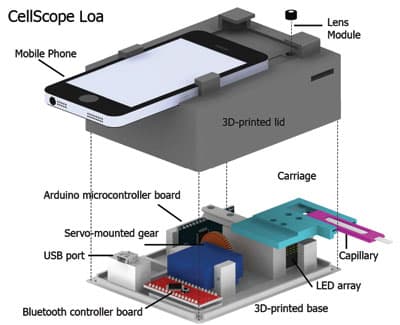UC Berkeley Engineers: Smartphone Microscope To Detect Parasites In Blood
A phone based app that can do point-of-care blood test is a major step forward in control of many weakening diseases and a need of the hour. Amazingly, a team of engineers from UC Berkeley has created just that. Called 'Cellscope Loa', this is a smartphoe app that turns your handheld into a microscope which capture videos of a drop of blood and detects if it has been infected by parasitic worms. The next-gen Cellscope technology has been employed to build a first-of-its-kind device that uses the combo of hardware and software automation with imaging technology to create a simple and highly useful diagnostic solution. With the fast and accurate blood test results, doctors can take potentially life-saving treatment decisions easily and save lives.
Replacing the fluorescent stains or molecular markers by Cellscope video, the UC Berekeley team was able to fit the most conventional screening methods in the comfort of a smartphone and a small 3D-printed plastic base which is used to place the sample of patient's blood. The base is made up of all the circuitry, microcontrollers, LED lights and a USB port to plug the smartphone in.

The device is controlled via the Bluetooth-powered smartphone app that processes and analyzes the sample of blood. Gears located inside the base pass the sample of blood in front of the phone's camera, and the app's algorithm detects the “wriggling†motion of the worms from the video captured. Not only is the presence of parasitic worms detected, but a count is displayed too.
After the blood is obtained by pricing the patient's finger, from loading the blood in the base, the entire procedure takes < 2 minutes, which is amazingly fast. Thanks to the fast process, any doctor or health worker can rapidly decide it is safe to administer IVM or not. With this automated technique, the chance of human error is eliminated too.
Check out a short demonstration video put together by UC Berkeley team to see the process in action:
Such an app will be a boon for developing nations like Africa for bringing point of care solutions to thousands affected with deadly diseases. What are your thoughts about the Cellscope Loa app? Share with us in comments below.r
Source: #-Link-Snipped-#
Replacing the fluorescent stains or molecular markers by Cellscope video, the UC Berekeley team was able to fit the most conventional screening methods in the comfort of a smartphone and a small 3D-printed plastic base which is used to place the sample of patient's blood. The base is made up of all the circuitry, microcontrollers, LED lights and a USB port to plug the smartphone in.

The device is controlled via the Bluetooth-powered smartphone app that processes and analyzes the sample of blood. Gears located inside the base pass the sample of blood in front of the phone's camera, and the app's algorithm detects the “wriggling†motion of the worms from the video captured. Not only is the presence of parasitic worms detected, but a count is displayed too.
After the blood is obtained by pricing the patient's finger, from loading the blood in the base, the entire procedure takes < 2 minutes, which is amazingly fast. Thanks to the fast process, any doctor or health worker can rapidly decide it is safe to administer IVM or not. With this automated technique, the chance of human error is eliminated too.
Check out a short demonstration video put together by UC Berkeley team to see the process in action:
Such an app will be a boon for developing nations like Africa for bringing point of care solutions to thousands affected with deadly diseases. What are your thoughts about the Cellscope Loa app? Share with us in comments below.r
Source: #-Link-Snipped-#
Replies
You are reading an archived discussion.
Related Posts
A team of researchers from Indian Institute of Science Education and Research (IISER) Kolkata and the Physical and Materials Chemistry Division, CSIR - National Chemical Laboratory, Pune have been working...
Blackberry is planning to introduce a new Virtual SIM in India that will let people have 9 different mobile numbers on one device. The Canadian company has been trying to...
Usually I just
tar cvpzf backup.tgz --exclude=/lost+found --exclude=/backup.tgz --exclude=/mnt /then I just copy backup tar in my other drive or external drive.
Re-install bare Arch and
tar xvpfz backup.tgz -C...
In the company's own words, a two year odyssey has brought a new borderless smartphone to ZTE Corporation. Called the ZTE Nubia Z9, here's a new Android 5.0 Lollipop OS...
Quote: At BIOMEDevice Boston on May 6, Segway inventor and veteran medical device inventor Dean Kamen had some words of wisdom for engineers—gained from his experience developing an array of...
